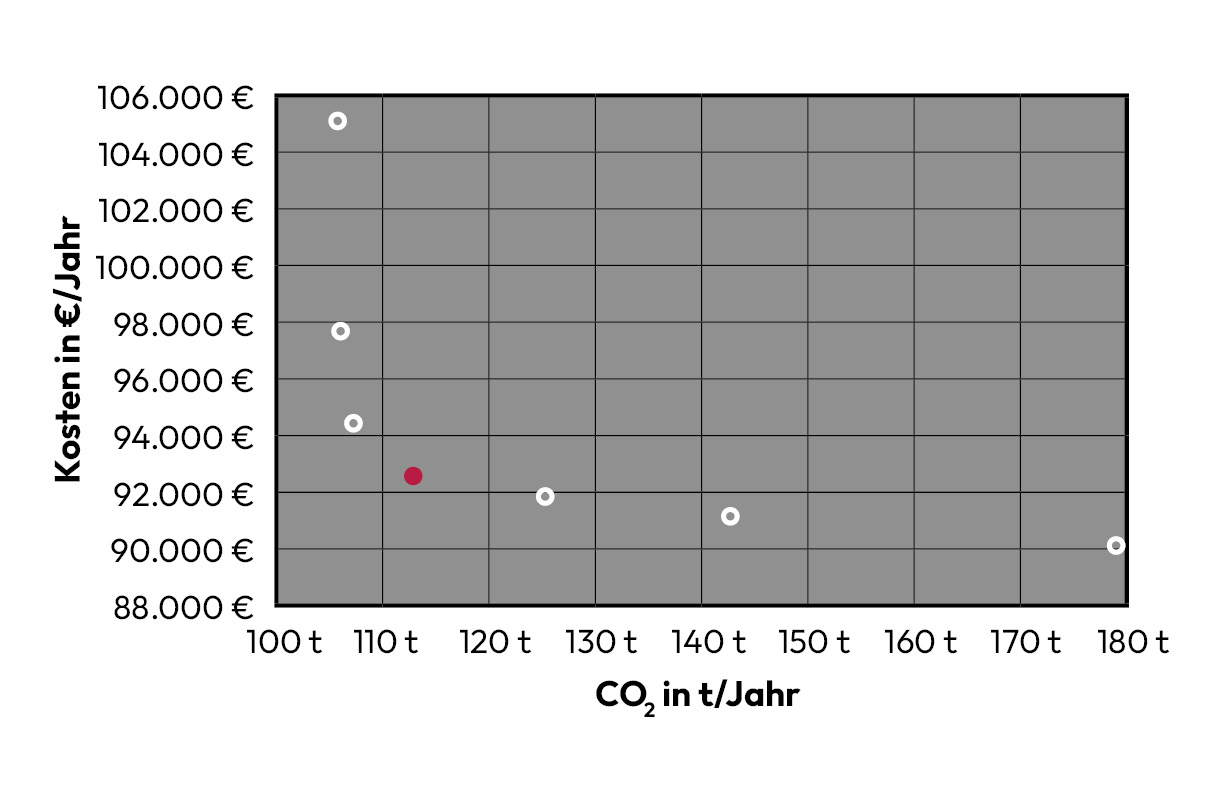Economic efficiency vs. climate neutrality?
23 October 2023
 KISTERS optimization software shows correlations between costs and CO2 reduction in the transformation of energy systems
KISTERS optimization software shows correlations between costs and CO2 reduction in the transformation of energy systems
Aachen, October 23, 2023.
In order to achieve the political goals of decarbonization, heat transition, climate neutrality and CO2 reduction, all energy suppliers will have to transform their supply systems, potentially at immense cost. Ways are being sought to integrate renewable energies as cost-effectively as possible, to advance electromobility, to set up district heating systems that are less dependent on fossil fuels, and much more. There are many adjusting mechanisms in energy systems, the possible combinations and effects of which are difficult for human decision-makers to keep track of.
To enable energy supply companies to put their investments on a secure footing in terms of the energy transition, the IT solution BelVis ResOpt from the Aachen-based IT service provider KISTERS AG is an important and reliable decision-making aid that shows companies cost- and CO2-optimal options for action and future scenarios. This enables them to quickly find out, firstly, which options for CO2 savings are already feasible in the short term in their current energy system, e.g. by changing the operating modes of the generators, and, secondly, which paths and investments make sense for the conversion of their system in the long term. A new feature is that users can weight the two optimization targets “costs” and “CO2 quantity” themselves and thus define a framework for the solution options shown.
Energy suppliers can run through various scenarios of their own system in BelVis ResOpt and thus, for example, answer questions such as “What does a CO2 saving of 30 percent cost me?”.
Correlation of costs and CO2
In the multi-criteria optimization, the user can define how the objective function is proportionally composed of costs and CO2 quantity. In the “Costs” component, all costs incurred (energy price, capacity price, change and start-up costs) are added up. The “CO2” component automatically takes into account all quantities that are mapped via CO2 purchase or supply contracts. The aim of the Pareto optimization in BelVis ResOpt is to determine the relationship between costs and CO2 in an optimization model and to display it graphically.
Fulfilling laws in the context of the energy transition
Based on mathematical models, BelVis ResOpt helps utilities understand which investments they can make to meet the requirements of, among others, the Heat Planning and Decarbonization of Heat Networks Act (“Municipal Heat Planning Act”) and the Climate Protection Act (“KSG”), and how they can furthermore meet climate targets, in some cases even in the short term and without investments, simply by using existing degrees of freedom in their energy systems.
Energy saving in industry
Not only energy suppliers but also industrial companies can use BelVis ResOpt to uncover saving and efficiency potentials and to run through future scenarios, e.g. in the metal, chemical and paper industry as well as in refineries. This is because there is great potential, particularly in energy-intensive industry, to save energy, make greater use of renewable energies, and thus contribute to slowing down climate change.

Image: Exemplary relationship between costs and CO2 emissions in an energy system, shown as a Pareto front. Most important finding (in red): Very low CO2 emissions can already be achieved with relatively low investments. (Source: KISTERS)
About KISTERS
Making greater use of renewable energies, advancing the energy transition, mitigating the effects of climate change – that is our passion and our motivation. As a pioneer for the intelligent use of renewable energies, we develop digital solutions with more than 700 employees to use our earth’s resources more responsibly. Our portfolio for the energy industry includes market-oriented software for energy data and portfolio management, metering and metering point operation, energy trading and sales, forecasting, virtual power plants and smart grids/control technology, among others. More than 750 companies from the energy sector and industry rely on KISTERS software.
Further press information can be found at KISTERS AG at
www.kisters.de/news
In case of publication I ask for a reference copy.
Press contact
KISTERS AG
Astrid Beckers
Wetterkreuz 13a
91058 Erlangen
Phone: 09131 480096 39
Fax: 09131 480096 55
astrid.beckers@kisters.de
 KISTERS optimization software shows correlations between costs and CO2 reduction in the transformation of energy systems
KISTERS optimization software shows correlations between costs and CO2 reduction in the transformation of energy systems